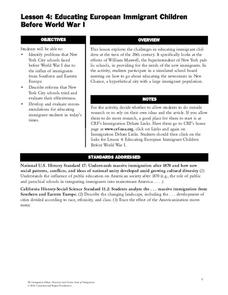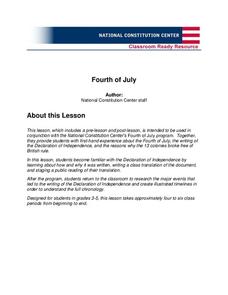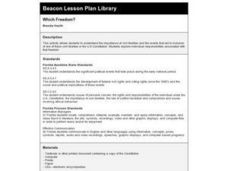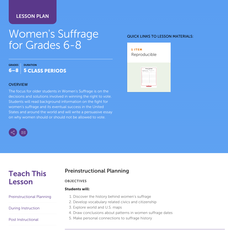Curated OER
Early Presidents and Politics
Students investigate early presidents of the United States. Students complete a series of lessons in which they research the contributions and political climate during the terms of U.S. presidents from George Washington to Andrew Jackson.
Curated OER
Progressivism (6)
In this online interactive American history worksheet, students answer 15 fill in the blank questions regarding the Progressive Movement. Students may submit their answers to be scored.
Stanford University
Civil Rights or Human Rights?
Young citizens consider the American civil rights movement as part of the global struggle for human rights. After using a timeline activity to learn about the major events in the civil rights movement, class members study...
Constitutional Rights Foundation
Educating European Immigrant Children Before World War I
As if surviving a journey to America wasn't enough of a feat for early 20th century immigrants, they then needed to settle into American life. Learn about the ways New York public education attempted to meet the needs of its students,...
Curated OER
Discovering American Symbols
Help youngsters get to know their states and capitals, explore their own country, and study American symbolism. They take a "trip" across America collecting symbols, images, and information about each state as they go (through text and...
National Constitution Center
Fourth of July (Grades 3-5)
Bring history to life for your young scholars with a Fourth of July lesson series. After a class reading of the Declaration of Independence, students translate this pivotal document into layman's terms before working in small...
Curated OER
The Federalist Debates: Balancing Power Between State and Federal Governments
Students examine the pros and cons of state sovereignty vs. federalism, as argued by the Founding Fathers. They identify the basic positions of each side, complete a worksheet, and write a persuasive essay arguing for Jefferson or Hamilton.
Curated OER
The Bill of Rights in Current Events
Divided the class into pairs, each group is assigned one of the amendments. They use the internet to research current cases and issues involving their amendment. They are then lead into the introduction to some of the basic concepts of...
Curated OER
Which Freedom?
Fourth graders choose on the freedoms in the Bill of Rights and research it on the internet. They answer specific questions using their research and produce a written document using a computer.
Curated OER
The Pledge of Allegiance
Students study the history of the Pledge of Allegiance. They investigate the First Amendment concept of separation of Church and state using Internet resources.
Curated OER
Philanthropy in History Lesson 1: We the People Hall of Fame
Students examine the lives of people who contributed to the common good, and democracy. They investigate grievances that lead to the call for American independence and look at the costs that are incurred as a result of personal acts of...
Curated OER
Race and Voting in the Segregated South
High schoolers examine the history of African American voting rights. In this voting rights lesson, students listen to a lecture on African American voting rights between the years 1890 and 1965. High schoolers respond to discussion...
Curated OER
The Gas Laws
A couple of gas law charts and the history of the gas laws constitute this presentation. Notes are included for the slide that illustrates how to perform gas law calculations. This is a simple collection, a visual aid enhance to your...
Curated OER
The National Women's Party and the Enfranchisement of Black Women
Students analyze the attitudes and hostility given to African-American women within the National Women's Party. They finish the lesson by examining another moment in the party's history and writing about it.
Curated OER
Understanding Tax: Your Role as a Tax Payer
Every adult should know that it is their responsibility to help fund public goods and services by paying taxes. Help young people get a handle on the history, evolution, purposes for, and reasons why they should pay taxes too.
Curated OER
Democratic Process, Constitutional Issues, Local Government
Twelfth graders engage in the decision making process so as to encourage them to become active citizens upon graduation from high school.
Curated OER
What Is Democracy?
Middle schoolers explore the concept of democracy. They define and describe democracy and choose an issue they believe the government should care about for its people. They write a persuasive essay about their issue.
Curated OER
Marching For Freedom
Students appreciate the sacrifices that people from across the country made to ensure that all citizens could exercise their constitutional right to vote. They access excellent websites and documents imbedded in this plan to guide their...
Curated OER
Raids and Arrests of Enemy Aliens
Student read background summary information and debate how much control did the government require to keep the nation safe. They research how World War II restrictions on enemy lines were enforced and how it related to the U.S....
Curated OER
Cartoons for the Classroom: Celebrating the 19th Amendment
Eighty-eight years after women earned the right to vote, a women ran for president. Young analysts consider the role women play in politics, how they are portrayed, the standards they are held to, and if they are still treated unfairly...
Judicial Learning Center
Your 1st Amendment Rights
Why should classes care about the First Amendment? An engaging lesson serves as a powerful tool for answering just that. As all four cases in the lesson relate directly to freedom of expression in schools, young scholars explore the...
Judicial Learning Center
Your 4th Amendment Rights
Americans love to learn about their rights, especially those that protect them from the government's power to invade their privacy. Young people are especially engaged by this topic. An informative lesson explores four Supreme Court...
National Endowment for the Humanities
George Washington: The Precedent President
Everyone knows that George Washington was the first president, but do your scholars know why that was so important? The lesson plan, the third in a sequence of three, allows learners to understand how George Washington set a precedent...
Scholastic
Women's Suffrage for Grades 6–8
Learners study the decisions and solutions involved in winning the right to vote. After reading background information on the fight for women's suffrage, including one woman's story, and its eventual success in the United States and...























